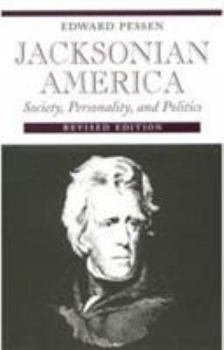Jacksonian America: Society, 0ality, and Politics
Select Format
Select Condition 
Book Overview
A perennial choice for courses on antebellum America, Jacksonian America continues to be a popular classroom text with scholars of the period, even among those who bridle at Pessen's iconoclastic views of Old Hickory and his "inegalitarian society."
Format:Paperback
Language:English
ISBN:0252012372
ISBN13:9780252012372
Release Date:June 1985
Publisher:University of Illinois Press
Length:400 Pages
Weight:1.45 lbs.
Dimensions:1.1" x 6.9" x 10.1"
Customer Reviews
1 rating
The Egalitarian Myth
Published by Thriftbooks.com User , 19 years ago
In his Jacksonian America, Edward Pessen seeks to dispel what he sees as an unfair glorification of an era and a man, using harrowing statistics and anecdotes concerning the condition of "the common man" to support his thesis that the Jacksonian era was by no means egalitarian. He states that the era was one of "inequality, whether in material condition, status, opportunity, or influence and power." He further contends that the title of the era is a misnomer, in direct contrast with Page Smith, in that Andrew Jackson did not dominate the era in any historically responsible sense, and that it is ironic that an era that is named for a supposed champion of the common man was actually quite harsh for that segment of society. The book opens with several chapters of social history, based predominately on the observations of foreign travelers and statistical information from domestic sources. The outlook is grim for large segments of society: the Irish, blacks -- free and enslaved -- any other poor, and women. Women (though many contented themselves with what is called the "cult of womanhood") are virtual nonentities in any legal or political sense; property is transferred to the husband upon marriage, and even in divorce due to the husband's infidelity (in those states where divorce exists), the property does not revert back to the woman. If a woman did not marry, she was a perpetual minor in the eyes of the law. Yet by age 25, she was considered an old maid. Free blacks and Irishmen, besides having to contend with extreme discrimination from others, not to mention ethnic riots, also endured a deep antagonism between each other, a by-product of job competition, among other things. The outsiders who came to America and wrote of the egalitarian ideal and how it was apparent in America are not supported by what Pessen presents as the facts. He contends that the possibility of upward mobility was a myth, though fervently believed by Americans and foreigners alike at the time, and virtually no power at all was in the hands of anyone except a very small, privileged elite. The gulf between them and the common man was huge. Alexis Tocqueville, widely considered the most astute foreign observer of Jacksonian America, is criticized at the base of his thesis; in claiming that egalitarianism was rife in America, he is charged by Pessen with seeing only the surface of the country. Indeed, Tocqueville's glowing reports that he saw no poverty and want in America belie his rose-coloured glasses. In the political realm, which occupies the second half of the book, Pressen finds little to praise. Though he concedes that at the beginning of the area general suffrage improved, he writes that Jackson was the beneficiary of this move rather than an instigator. Despite Jackson's reputation as friend to the common man, this was little more than successful political demagoguery. Indeed, Pessen finds no support for the belief that what can be considered the common man reap





